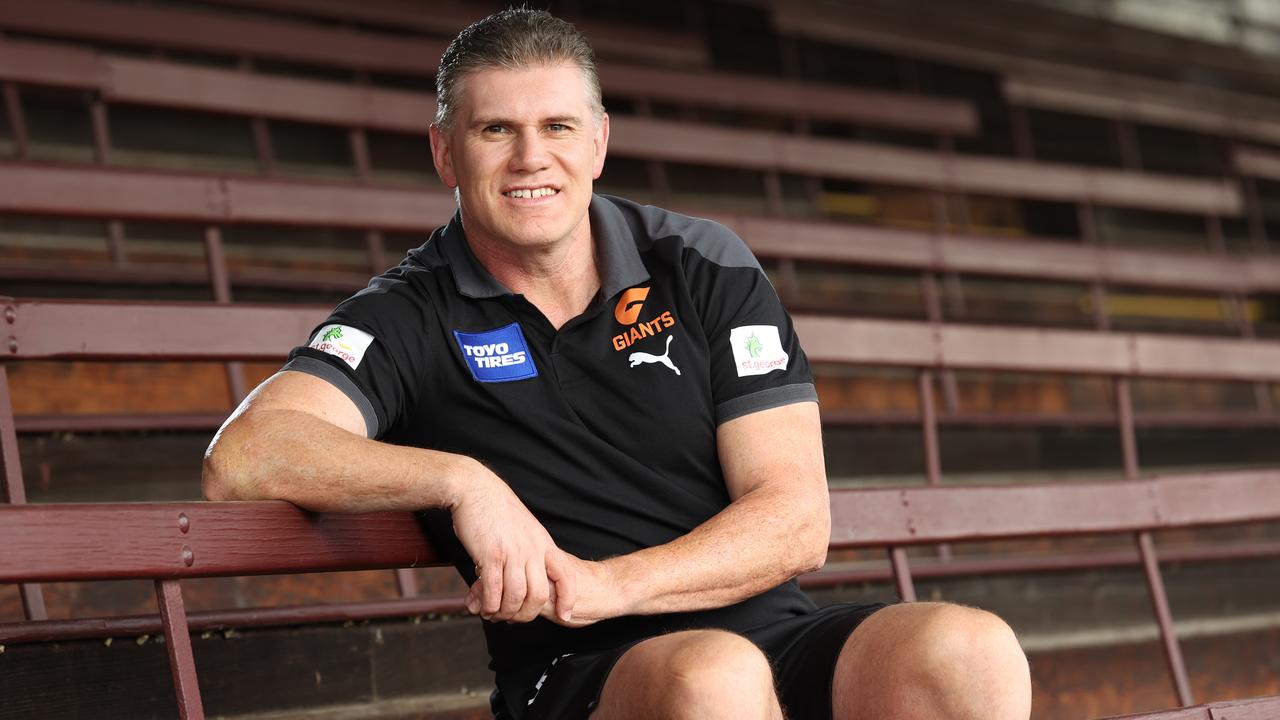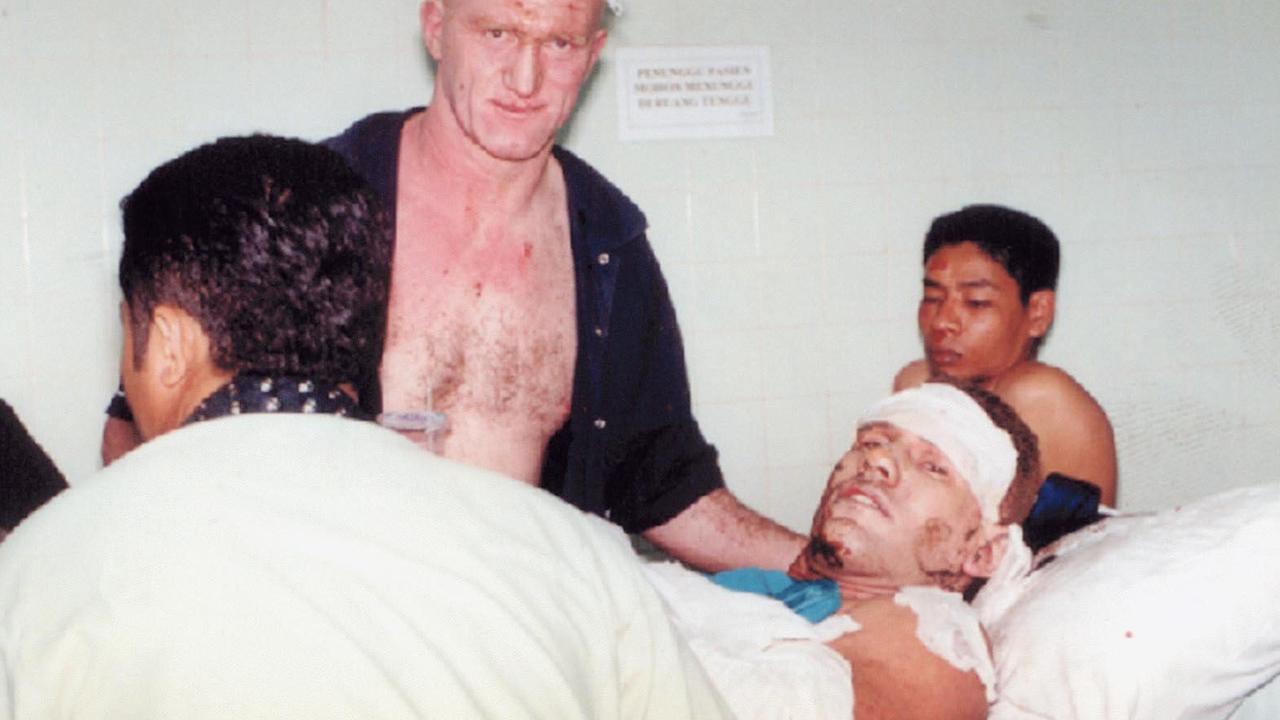Bali bombings anniversary: AFL great Jason McCartney reflects on tragedy
The Bali Bombings are being remembered as a triumph of good over evil in ceremonies today, to mark 20 years since the terror attacks. Jason McCartney reflects on his life post the tragedy.

Most new recruits Jason McCartney, the Greater Western Sydney general manager of football, now adds to the Giants’ playing list were not born when the Bali bombings ripped a hole through the nation’s innocence and reshaped the world 20 years ago.
And several of the Gen Z products are unaware their boss, who bounded from the small country town of Nhill, in western Victoria, to the AFL stage aged 16 in 1990, was a miracle survivor of the blast that claimed the lives of 202 people from 21 countries, including 88 Australians, on October 12, 2002.
Nor that his dramatic return to football has become stitched into national folklore, or that he is a talisman for burns victims worldwide, a motivational speaker and best-selling autobiographer.
“It’s funny, there are several young players, 18 to 22-year-olds, who don’t have a familiarity with what happened at Bali, and they likely look at me and think: Geez, he’s got some scars that bloke,” McCartney said.
Like Wade Derksen, the 21-year-old key forward who was welcomed to the Giants through this years’ mid-season draft.
“I met Wade’s parents when they came down from Darwin and his dad is telling him all about my story. I’ve overheard a few parents tell the players about Bali,” said McCartney, a 182 AFL game veteran.
“I forget at times that Bali was 20 years ago and I am now 48. I used to tell playing groups the story when I was at the Bulldogs and Fremantle and AIS (Australian Institute of Sport-AFL Academy) but back then they already had a good idea of what happened.
“If the younger players now come and ask me about Bali I am very open to talking about it. But it isn’t like I sit the first to third year blokes down anymore and tell my story.”
As the world prepares to pause and remember those killed and injured in the horrific bombings, McCartney’s own recollections remain photographic.
“When I talk about it now it all still comes back. I remember every little thing from that night, and afterwards, like it all happened yesterday. The memories are very strong,” he said.
“But it’s not like it haunts me or anything. It doesn’t control me; I have control over it.”

It was supposed to be just another end-of-season footy trip.
McCartney was seeing out a Saturday night in Patty’s Pub, along the grungy Kuta tourist strip, when a suicide bomber stood a few metres away and triggered a backpack bomb.
A flash of light rendered him temporarily blind, the boom perforated his eardrums and the force threw him across the bar. He said he thought he had been shot.
As the architects of the explosion had planned, that first blast flushed people into the street before a second, and much more powerful bomb, was exploded from inside a white van parked outside.
McCartney suffered massive shrapnel lacerations to his legs and second-degree burns to half of his body, some inflicted while helping carry others to safety, an act of bravery for which he was later awarded an Order of Australia medal.
When he finally arrived at Melbourne’s Alfred Hospital three days after the blast, after telling others he thought worse off to take the seat before him, life-threatening infection had already set in. He was placed in a coma and underwent multiple surgeries for skin grafts.
Then after 237 days of intensive recovery treatments, despite doctors repeatedly advising that he would likely never play football – let alone at the highest level – again, here he was.
Still a big-framed specimen, wearing compression pads and protective gloves, leading his Kangaroo teammates onto Telstra Dome on June 6, 2003 for the Round 11 clash against Richmond.
In professional sport, the anticipation so very often does not live up to reality. But not this time.
McCartney came on as a substitute to a roaring ovation and toe poked the ball to teammate Leigh Harding who kicked the match winner deep in the final quarter.
As the cliche goes, there was not a dry eye in the house when he announced to the crowd in an on-field post-game interview that he was hanging up the boots before being carried from the field on the shoulders of teammates.
The symbolism was just right.
Prime Minister John Howard encapsulated what many felt when later telling McCartney that “millions of people admire your guts”.
As much as the bombing had broken a nation’s heart, it now had a heroic tale of good trumping evil for the ages.
“I didn’t realise until the after-match function exactly what I had achieved,” he said. “I certainly wasn’t conspiring about how to motivate people, I just wanted to get back playing and get married.”

McCartney believed his 13-year football odyssey was over, but it turned out the game wanted him to stay and he has now spent 32 straight years as a player, youth development coach, assistant coach, list manager and football manager.
“I was obviously unlucky that it happened, but from the split second of that blast I have been unbelievably fortunate in many ways, in it opening doors and there were some great opportunities presenting. But if you don’t prove yourself, you don’t last, so I went at it hard.”
McCartney was aged just 16 and battle-hardened after two years playing seniors across the Wimmera when he walked into Collingwood’s dressing room, a big kid who still slept under an Essendon club doona cover.
Seeking more game time, he switched to the powerhouse Adelaide Crows in 1995 but, after missing the club’s 1997 Premiership, shifted back to another powerhouse in North Melbourne. As luck would have it, he stood at fullback for a North side beaten by the Crows in the 1998 Grand Final and missed the 1999 Kangaroos Grand Final win through suspension.
“I came in as a (draft) pick four chock full of confidence and that was slowly eroded. There were definitely more lows in my footy career than highs, as there probably would be for most. It’s just that the highs are so darn high that you keep chasing them,” he said.
For now, McCartney is comfortably settled on Sydney’s North Shore and while Australian rules football is somewhat embedded in Sydney’s eastern suburbs, he said the western suburbs are generally apathetic to the AFL product.
“Our stadium is fantastic, our product is great and there is a massive population – but small crowds. So, there is great opportunity here, but the question is how do you crack it?” he said.
In a fickle market that is a big issue.

The other big problem for GWS is attracting and retaining players to a club based far from the AFL’s heartland and, typically, hundreds if not thousands of kilometres from home.
“When you look at our list composition, our academy is not really producing as we only have three on the list from Sydney,” McCartney, who is also GWS list manager, said.
“Our academy boys are more from regional areas in NSW and the ACT, and then many of them went to school in Melbourne.”
The VFL/AFL recruitment process is talent first, but the Giants must equally consider attitude and character to combat the dreaded ‘go-home’ factor.
If the Giants want resilient players, they have picked the right person to identify who might dig in and stick it out.
“I built a very strong resilience base over a period of time during my footy career and that helped me no end through the Bali experience, and both experiences have combined and hold me in good stead for all the challenges I face in life,” he said.
A permanent memorial was opened on the site of Paddy’s Bar in 2003, the finishing touches are being put on the 20th anniversary ceremonies and McCartney has started reconnecting with people he met as a result of Bali.
“The overall feeling I have, when you get down to the nitty gritty, is it just comes back to ‘how fortunate’, because there are 202 others, including 88 Australians, who are not here for the anniversary,” he said.


